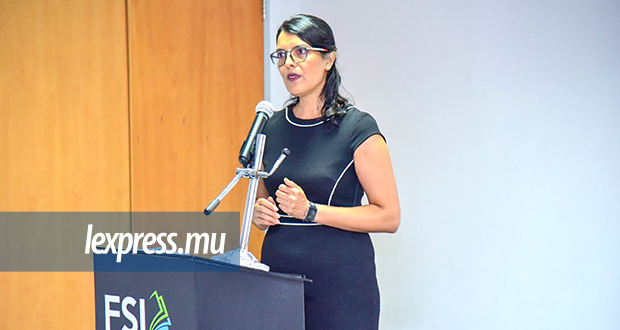Publicité
Aruna Radhakeesoon: “The ‘scorecard’ will bring greater transparency to corporate governance practices”
Par
Partager cet article
Aruna Radhakeesoon: “The ‘scorecard’ will bring greater transparency to corporate governance practices”

The recent removal of Mauritius from Financial Action Task Force (FATF) grey list has shown to the world that the local authorities are committed to toe the line as regards good governance. In this context, the National Committee on Good Governance (NCCG) is launching today a ‘scorecard’ for public and private organisations to self-evaluate and assess their peers on the best corporate governance practices. Its chairperson explains why this new mechanism is so important.
The last report bearing your signature indicates that one of the key events of the NCCG in 2021 will be the launching of the ‘scorecard’. What is the importance of this evaluation process in a company’s environment?
Many governance writers describe improving governance as a journey. The launch of the Mauritian ‘governance ‘scorecard’’ in 2021 is a major milestone in the journey of governance development within the Republic of Mauritius. The ‘scorecard’ builds upon and aligns with previous governance developments in the country. It provides an important new tool to measure the level of compliance of Mauritian organisations with good governance and best practices. The ‘scorecard’ goes beyond the ‘code’. It embraces international best practices in corporate governance to nurture the NCCG’s mission to “promote the highest standards of corporate governance in Mauritius”. Sustainability and managing climate change, for instance, are evolving as cornerstones of corporate governance. This ‘scorecard’ will help companies better operationalize the ‘code’ and it is part of an evolving process aimed at improving corporate governance practices.
What main features of good governance is the NCCG banking on as it prepares to provide organisations with the assessment mechanism that the ‘scorecard’ is?
The main features are meaningful reporting leading to better disclosure and increased transparency and accountability within a framework of integrity. The ‘scorecard’ will only measure governance practices as publicly disclosed, that is, information that organisations have disclosed in their annual reports and on their websites. Therefore, for the purposes of the assessment, any governance practice not reported on or disclosed in an organisation’s annual report and website will be deemed not to exist. One should remember that the ‘code’ adopts an ‘apply and explain’ principle. It is therefore not sufficient to ‘apply’ the principles. The manner in which the principles have been applied should also be properly and adequately explained in the annual reports and websites of organisations. The ‘scorecard’ will then assess the quality of the explanations they have provided.
Before launching the ‘scorecard’, the NCCG has contacted companies to get their full commitment to the process. What has been the response?
Twenty-one listed companies have voluntarily accepted to take part in the first ‘scorecard’ evaluation exercise. These companies include large conglomerates and banks.
The ‘scorecard’ can be viewed as part of the sustainability process to maintain the uplift of the Anti-Money Laundering and Financing of Terrorism (AML/ CFT) standards in our jurisdiction.
Now that the mechanism has been put on target waiting for the green light to move on, how will the assessment be carried on within the ambit of the twenty-one listed companies that have voluntarily accepted to play by the rules of the game?
The assessment of the corporate governance practices of organisations against the ‘scorecard’ will be carried out through a two stage process. During the first stage, an independent assessor selected by the NCCG will assess organisations using the ‘scorecard’ and will summarise their findings in preliminary reports. During the second stage, the independent assessor will table their preliminary findings/results/reports to independent jury panels selected by the NCCG, for review/ validation. The preliminary findings/results/ reports will be reviewed by those independent jury panels and amended, if needed. Once reviewed and validated, the findings/results/reports of the independent jury panels will be deemed final and ready to be adopted by the NCCG.
At the end of the day, what does the NCCG expect to gather from the launching of the ‘scorecard’?
The ‘scorecard’ is aligned with the Organisation for Economic Co-operation and Development (OECD), the FATF principles of corporate governance and the Basel goals for governance practices. The ‘scorecard’ will measure ‘objectively’ the level of compliance of Mauritian organisations with governance practices. This is extremely important for relationships with foreign investors and regulators. The ‘scorecard’ will, over time, lead to greater transparency of corporate governance practices in organisations and, consequently, it will put Mauritius amongst the few countries in the world to measure progress in corporate governance practices in a structured, objective and quantitative manner. The application of the ‘scorecard’ will require considerable skill and judgment in both its application and analysis. It is a comprehensive self-assessment tool, which will allow organisations to gauge corporate governance practices for themselves and across companies.
One of the features of the ‘scorecard’ that needs clarification is the recourse to metrics to measure the degree of companies’ commitment to endorse the many demands of good governance. What is the logic guiding this principle?
The use of weights is tightly linked to the purpose of the ‘scorecard’. In adopting weights, the NCCG is prioritising how it intends to use the ‘scorecard’ and what changes in corporate governance behaviour it is expecting from organisations. Participation in the ‘scorecard’ evaluation exercise will initially be on a voluntary basis. The detailed individual ratings and results of each organisation will remain confidential in the first couple of years. A ‘scorecard’ yearly report will be published by the NCCG, in which good observance, shortcomings recommended areas of focus in governance practices will be highlighted without pinpointing specific organisations. It is the aspiration of the NCCG that over time Corporate Mauritius will gain in maturity and there will be no issue with individual ratings and results of organisations being made public through the ‘scorecard’ yearly report.
Let’s consider another approach of the NCCG in its efforts to transform the whole corporate community into players where good governance becomes a source of inspiration to do business. Is there any specific reason that prompted the decision to involve listed companies in the first assessment stage?
Following the launch of the ‘scorecard’, the NCCG will embark on its first ‘scorecard’ evaluation exercise. It has opted to restrict participation to listed companies only. As they de facto have greater reporting, accountability and disclosure obligations, given that they use public monies to finance their business activities. Next year, the evaluation exercise will be opened to many more organisations.
Introducing the principle of diversity and inclusion within the corporate world is the other priority on the NCCG’s agenda, after the launch of the ‘scorecard’. What is the main objective of the committee in targeting boards where some reforms are badly needed?
Improving the metric ‘diversity and inclusiveness’ across organisations is a journey over time. Our financial sector has matured sufficiently to move to the next level. Corporate Mauritius should aim to have more diverse boards in terms of age, qualification, skills, expertise, experience, gender and culture. This diversity would not only achieve a more balanced representation of our community but would also in stil greater independence. Inclusiveness would mean acting responsibly towards the surrounding poorer communities where we operate our businesses, while accommodating people with special needs in our labour force and mothers returning to the work market after a career break.
The composition of boards of directors in the corporate world often depends on the main shareholders’ goodwill. Shouldn’t the State give the good example by making diversity and inclusiveness part and parcel of its policy within all organisations where it has direct interest?
The parastatal board composition in Mauritius is an outlived model. It is no longer viable and should definitely be reviewed in the light of international best governance practices. The lack of independent directors on such boards coupled with a misunderstanding of the role and responsibilities of ministry representatives is a serious cause of concern.
The launch of the ‘scorecard’ comes at a time where Mauritius has just managed to emerge from the FATF grey. What insights or lessons could Mauritius draw after a slump that has plunged the jurisdiction into the darkest period of its journey within the financial sector?
The ‘scorecard’ comes in the wake of the emergence of Mauritius from such a list. It is worth noting that international organisations, such as the OECD, the International Monetary Fund, the World Bank, the United Nations Office on Drugs and Crime, the FAFT, the Eastern and Southern Africa Anti-Money Laundering Group and the Southern African Development Community, seek to promote private sector governance and anti-corruption principles and practices in their work with countries. They increasingly emphasize the importance of putting governance and anti-corruption at the centre of their work with member countries, including the private sector. In its anti-money laundering and combating terrorism finance campaign, the FATF places significant focus on the role of the private sector in this organisation’s global strategy to promote governance and integrity in the financial sector. The recent example of the preparations for Mauritius to exit the FATF’s grey list has illustrated the crucial role and contribution of the private sector in the process. It is, therefore, critical that organisations continue to demonstrate adherence, and effective application of corporate governance practices. The ‘scorecard’ can be viewed as part of the sustainability process to maintain the uplift of the Anti-Money Laundering and Financing of Terrorism (AML/CFT) standards in our jurisdiction.
You have tried to reach out to the director of the Financial Intelligence Unit, Carine Charlette-Katinic, to identify areas where your two organisations can join hands in the fight. What has been the outcome of this initiative?
This is still a work in progress, as nothing concrete has come out of this first meeting.
Publicité
Les plus récents






